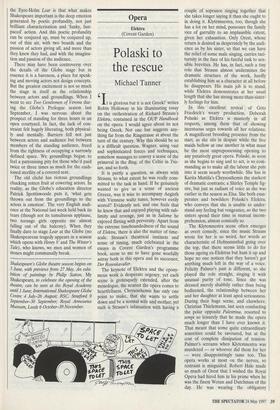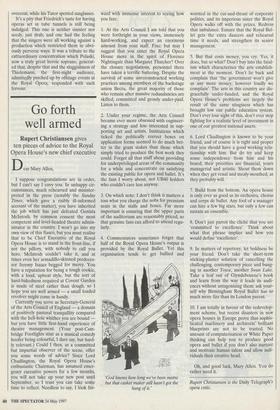Opera
Elektra (Covent Garden)
Polaski to the rescue
Michael Tanner
It is glorious but it is not Greek!' writes Robin Holloway in his illuminating essay on the orchestration of Richard Strauss's Elektra, contained in the OUP Handbook on the opera. I would agree about its not being Greek. Not one bar suggests any- thing far from the Ringstrasse at about the turn of the century. Why this should be so is a difficult question. Wagner, using vast and sophisticated forces and techniques, somehow manages to convey a sense of the primeval in the Ring, of the Celtic in Tris- tan, and so forth.
It is partly a question, as always with Strauss, to what extent he was really com- mitted to the task in hand. If he genuinely wanted to give us a sense of ancient Greece, was it wise to accompany Aegisth with Viennese waltz tunes, however eerily scored? Evidently not, and one feels that he knew that and enjoyed playing with sub- limity and revenge, just as in Salome he enjoyed flirting with perversity. Apart from the extreme timeboundedness of the sound of Elektra, there is also the matter of time- scale. Strauss's theatrical instincts and sense of timing, much celebrated in the essays in Covent Garden's programme book, seem to me to have gone woefully astray both in this opera and its successor, Der Rosenkavalier.
The keynote of Elektra and the epony- mous work is desperate urgency, yet each scene is grotesquely extended, after the monologue, the nearest the opera comes to heartfeltness. Chrysosthemis has only one point to make, that she wants to settle down and be a normal wife and mother, yet such is Strauss's infatuation with having a couple of sopranos singing together that she takes longer saying it than she ought to in doing it. Klytemnestra, too, though she has a lot on her mind, possesses the family vice of garrulity to an implausible extent, given her exhaustion. Only Orest, whose return is desired as desperately by the audi- ence as by his sister, so that we can have the relief of some male singing, carries taci- turnity in the face of his fateful task to sen- sible brevities. He has, in fact, such a tiny role that Strauss almost undermines the dramatic structure of the work, hardly establishing him as a character at all before he disappears. His main job is to stand, while Elektra demonstrates at her usual length that she has strong more-than-sister- ly feelings for him.
In this excellent revival of GOtz Friedrich's weary production, Deborah Polaski as Elektra is masterly in all respects, among them that of showing incestuous urges towards all her relations. A magnificent brooding presence from the start, as she sits in despair while the five maids bellow at one another in what must be the most unprepossessing opening to any putatively great opera. Polaski, as soon as she begins to sing and to act, is so com- manding as to make all the labour she puts into it seem nearly worthwhile. She has in Karita Mattila's Chrysosthemis the starkest of dramatic contrasts; a Shirley Temple fig- ure, but just as radiant of voice as she was earlier in the season as Elsa. She both exas- perates and bewilders Polaslci's Elektra, who conveys that she is unable to under- stand any feeling but vengeance, so the two sisters spend their time in mutual incom- prehension, almost comically so.
The Klytemnestra scene often emerges as overt comedy, since the music Strauss wrote for her is so weird, her words so characteristic of Hofmannsthal going over the top, that there seems little to do for those ageing ex-Elektras but ham it up and hope no one notices that they haven't got anything much left in the way of a voice. Felicity Palmer's past is different, so she played the role straight, singing it with unusual purity of tone. Since she was dressed merely shabbily rather than being bedizened, the relationship between her and her daughter at least aped seriousness. During their huge scene, and elsewhere, Christian Thielemann, last seen conducting the polar opposite Palestrina, resorted to tempi so leisurely that he made the opera much longer than I have ever known it. That meant that some quite extraordinary sonorities could be savoured, but at the cost of complete dissipation of tension. Palmer's screams when Klytemnestra was murdered — or whoever did them for her — were disappointingly tame too. This opera works at most on the nerves, so restraint is misguided. Robert Hale made so much of Orest that I wished the Royal Opera had hired him in his prime when he was the finest Wotan and Dutchman of the day. He was wearing the obligatory overcoat, while his Tutor sported sunglasses.
It's a pity that Friedrich's taste for having operas set in tube tunnels is still being indulged. This one is neither sinister nor seedy, just drab, and one had the feeling that the singers were all working against a production which restricted them in obvi- ously perverse ways. It was a tribute to the extraordinary concentration which Polaski, now a truly great heroic soprano, generat- ed that, despite that and the sluggishness of Thielemann, the first-night audience, admittedly psyched up by offstage events at the Royal Opera, responded with such fervour.



























































 Previous page
Previous page